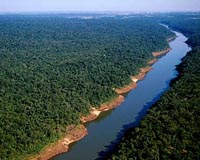| . |  |
. |
Santiago (AFP) Dec 16, 2009 Up to 40 percent of the biodiversity of some Latin American nations could be wiped out by 2100 if climate talks in Copenhagen fail to seal a global warming deal, a UN body warned Wednesday. A grim report by the Chile-based Economic Commission for Latin America and the Caribbean (ECLAC), warned the region, one of the lowest emitters of greenhouse gases, could bear one of the heaviest costs of climate change. "With a global temperature rise over 3 degrees Celsius, some countries or regions could lose up to 30 or 40 percent of their biodiversity," the report said. Such increases in temperature would lead to a sharp fall in rainfall in the Amazon "causing a substantial deterioration of jungles that are home to one of the world's largest concentrations of biodiversity." Rising sea levels would cause a huge movement of populations and the loss of land, while mangroves on the lower coasts of countries such as Brazil, Ecuador and Guyana might be swamped forever. Coastal areas of the River Plate in Argentina and Uruguay could also be seriously threatened. "If no international agreement is reached to mitigate the effects of climate change, the cost for Latin America and the Caribbean could be equivalent to 137 percent of the region's current GDP by 2100," the report warned. By 2100 the cost of climate disasters could reach an estimated 250 billion dollars a year, shooting up from the current annual average of 8.6 billion dollars. Bolivia, Chile, Ecuador, Paraguay and Peru could be among the countries worst hit, losing up to 60 percent of their arable lands, while water supplies could dwindle, said the ECLAC report unveiled at the Copenhagen conference. It stressed that the effects of unbridled climate change would vary from country to country, and remain unpredictable throughout this century. Some places like Argentina, Chile or even Uruguay might even see an initial increase in agricultural production thanks to rising temperatures if they climbed some 1.5 to two degrees from now until 2050. But anything above two degrees would be harmful in the long term. "Although Latin America and the Caribbean is the second region in the world with the lowest greenhouse gas emissions after Africa, it is nevertheless suffering the effects of global warming more than any other," the study said. "This urgently demands technological and financial support from developed countries for the region's efforts of adaptation and mitigation." Share This Article With Planet Earth
Related Links Forestry News - Global and Local News, Science and Application
 Forests offer first hope out of climate deadlock
Forests offer first hope out of climate deadlockCopenhagen (AFP) Dec 16, 2009 Rich nations Wednesday offered the first sign of progress at a UN climate summit, pledging 3.5 billion dollars to fight deforestation as talks bogged down on procedures and were marred by clashes. Six countries -- Australia, Britain, France, Japan, Norway and the United States -- said they would set up a fund to fight the loss of forests, a leading source of the rising temperatures feared to ... read more |
|
| The content herein, unless otherwise known to be public domain, are Copyright 1995-2009 - SpaceDaily. AFP and UPI Wire Stories are copyright Agence France-Presse and United Press International. ESA Portal Reports are copyright European Space Agency. All NASA sourced material is public domain. Additional copyrights may apply in whole or part to other bona fide parties. Advertising does not imply endorsement,agreement or approval of any opinions, statements or information provided by SpaceDaily on any Web page published or hosted by SpaceDaily. Privacy Statement |